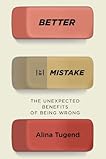 Better by Mistake: The Unexpected Benefits of Being Wrong by Alina Tugend
Better by Mistake: The Unexpected Benefits of Being Wrong by Alina Tugend
Is it a good sign or a bad sign when the author references mostly books that I’ve already read? On one hand, it’s bad because it indicates that maybe this sub-genre (popular science) is panned out for me. On the other hand, the fact that this novel still managed to get me to read to the end is a testament to Turgend’s writing abilities.
Better by Mistake is about exactly what you think it’s about. It’s about how people make mistakes (the factors that lead up to them) and how both external and internal factors influence whether or not they choose to admit them. She also touches on apologies, and whether they work or not, based on when they’re given, how they are given, and whether they are backed up with policy change.
I can’t say that this information is really directly applicable to anyone except the leader of a company. Aviation and medicine have already delved into this subject, and if you’re not in a position of authority over others, you can’t do much about whether your work culture encourages honest admittance of mistakes, or punishes mistakes so much that you’re better off denying and deflecting.
Still, the book is well organized, and has a decent ratio of facts to anecdotes. If you haven’t read much in pop science/pop sociology/pop psychology, this wouldn’t be a bad place to start. If you’ve already devoured anything written by anyone within five degrees of separation between them and Malcolm Gladwell, this might feel a bit overdone.
